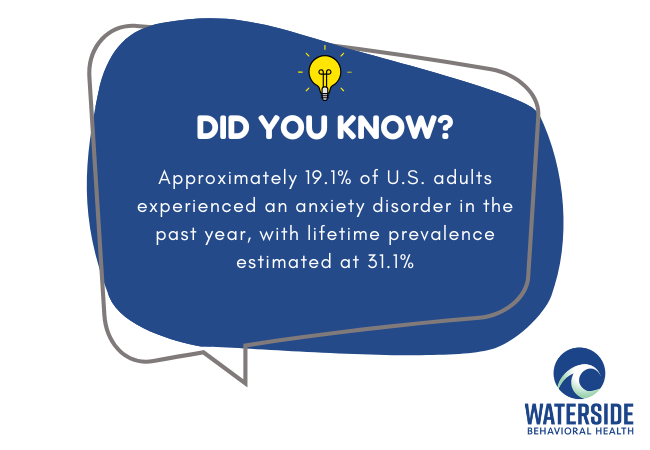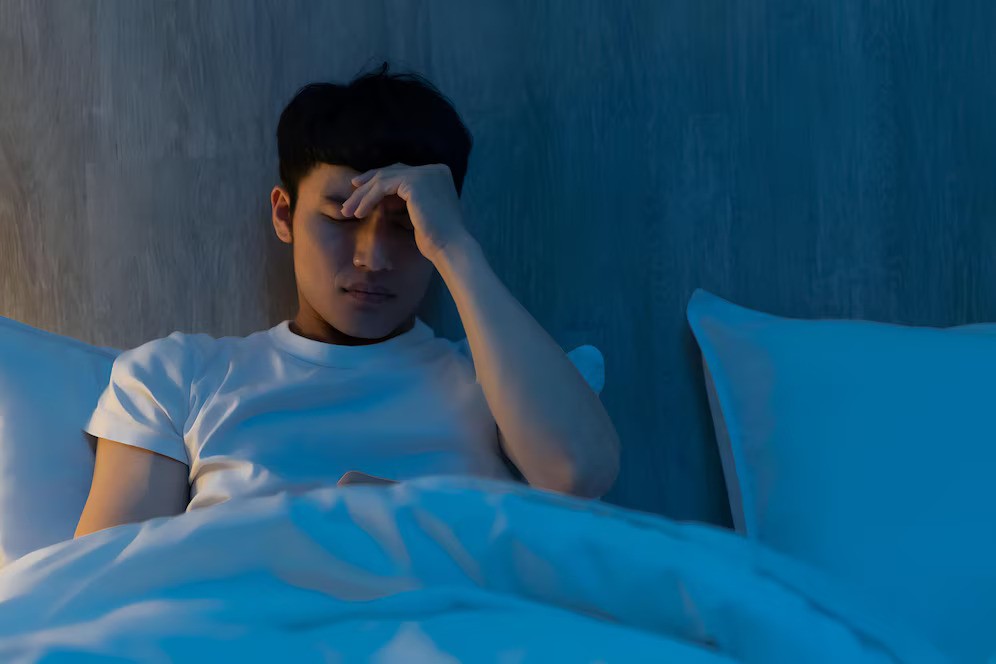Anxiety and sleep problems are deeply interconnected. For many individuals, anxiety can make it difficult to fall asleep, stay asleep, or achieve restful, restorative sleep. Conversely, poor sleep can exacerbate anxiety symptoms, creating a vicious cycle that can significantly impact mental and physical health.
At Waterside Behavioral Health, we specialize in treating anxiety through comprehensive mental health treatment programs in Massachusetts, combining therapies like Cognitive-Behavioral Therapy in Massachusetts (CBT), Dialectical Behavior Therapy in Massachusetts (DBT), and Trauma Therapy in Massachusetts. Understanding the relationship between anxiety and sleep is a critical step toward improving both.
This guide explores how anxiety disrupts sleep, how poor sleep worsens anxiety, and effective strategies to achieve more restful nights.
How Anxiety Affects Sleep
Anxiety activates the body’s stress response system, known as the fight-or-flight response, releasing hormones like cortisol and adrenaline. While helpful in real emergencies, chronic activation due to anxiety makes it difficult for the body and mind to relax enough for restful sleep.
Common ways anxiety affects sleep include:
Difficulty Falling Asleep
-
Racing thoughts about future worries or past regrets keep the mind active at night.
-
Heightened physical arousal (e.g., rapid heartbeat, shallow breathing) prevents relaxation.
Difficulty Staying Asleep
-
Frequent awakenings due to nightmares, physical tension, or sudden spikes in anxiety.
-
Hypervigilance makes individuals overly sensitive to noises or bodily sensations.
Poor Sleep Quality
-
Even if sleep occurs, it may be light and restless, leading to feelings of exhaustion upon waking.
Sleep Disorders Linked to Anxiety
-
Insomnia: The most common sleep disorder associated with anxiety.
-
Sleep Apnea: Sleep-disordered breathing can worsen anxiety through repeated sleep interruptions.
-
Nightmares: Common in individuals with PTSD and generalized anxiety disorder.
The Science Behind Sleep and Mental Health
Sleep is essential for emotional regulation. During sleep—especially deep sleep and REM (rapid eye movement) stages—the brain processes emotional memories, stressors, and learned experiences. If sleep is fragmented or insufficient, the brain doesn’t get the chance to clear out emotional clutter, leading to increased irritability, heightened emotional reactivity, and impaired cognitive functioning the next day.
For individuals with generalized anxiety disorder, social anxiety, panic disorder, or trauma-related conditions, this lack of emotional processing only intensifies their symptoms. Sleep deprivation fuels anxiety, and anxiety prevents restful sleep—a loop that can quickly spiral without proper intervention.
Many people enrolled in mental health treatment programs in Massachusetts report improvements in sleep once their anxiety symptoms are addressed directly. Comprehensive care that treats both the mental and physical symptoms of anxiety is key to breaking the cycle.
Sleep Disorders Linked to Anxiety
Certain sleep disorders are commonly associated with anxiety, including:
-
Insomnia: The most common sleep disorder linked to anxiety. Individuals may lie awake for hours, unable to shut off their thoughts.
-
Restless Leg Syndrome (RLS): This neurological condition causes an uncontrollable urge to move the legs, often disrupting sleep and increasing distress.
-
Sleep Apnea: Though not directly caused by anxiety, the breathing interruptions from sleep apnea can mimic panic symptoms, leading to increased nighttime anxiety.
-
Nightmares/Night Terrors: Particularly prevalent in those with PTSD or trauma histories.
Because these issues often coexist, addressing only the surface-level symptoms of insomnia or fatigue without exploring anxiety as a root cause can lead to ineffective treatment outcomes.
Signs Anxiety May Be Affecting Your Sleep
If you’re unsure whether your poor sleep is related to anxiety, here are common indicators to consider:
-
You feel mentally exhausted but physically restless at night.
-
Your mind races with worries, fears, or hypothetical scenarios as you try to fall asleep.
-
You wake up feeling more tired than when you went to bed.
-
You dread bedtime because you know you’ll struggle to sleep.
-
Your sleep issues have lasted longer than three months.
When these signs persist, it may be time to consider professional support from a trusted mental health treatment center in Massachusetts that offers specialized care for anxiety-related conditions.
Strategies to Improve Sleep When You Have Anxiety
Although anxiety can significantly impact sleep, there are evidence-based strategies that can help restore restful nights.
1. Establish a Consistent Bedtime Routine
Creating a calming wind-down routine helps signal to your brain that it’s time to relax. Avoid screens, caffeine, and stressful conversations at least an hour before bed. Activities like reading, gentle stretching, or taking a warm shower can prepare your body for rest.
2. Practice Relaxation Techniques
Mindfulness exercises, progressive muscle relaxation, and deep breathing can lower your body’s stress response. These techniques train your nervous system to shift from fight-or-flight to rest-and-digest mode.
3. Limit Stimulants and Alcohol
Caffeine and alcohol may worsen anxiety and disrupt sleep architecture. Limiting intake, especially in the afternoon and evening, is essential for better rest.
4. Cognitive Restructuring
Challenging anxious thoughts through therapeutic frameworks like cognitive-behavioral therapy in Massachusetts helps individuals reframe negative thinking and reduce nighttime rumination.
5. Address Underlying Mental Health Conditions
Sometimes poor sleep is a symptom of untreated mental health disorders, such as depression or trauma. Seeking support through depression therapy in Massachusetts or specialized trauma therapy in Massachusetts can address root causes that interfere with sleep.
A Holistic Approach to Treatment
Sleep disturbances caused by anxiety rarely improve with one-size-fits-all solutions. A holistic approach that includes therapy, lifestyle changes, and sometimes medication is often necessary to support long-term sleep improvement.
Some treatment centers incorporate dialectical behavior therapy in Massachusetts, a form of therapy that combines mindfulness with behavioral change strategies. DBT helps individuals regulate emotions and improve distress tolerance—skills that are vital for those whose anxiety spikes at night.
Moreover, therapeutic environments that focus on the whole person—body, mind, and spirit—can create a stronger foundation for healing. It’s not just about sleeping through the night; it’s about restoring peace and calm in your daily life.

Incorporating Therapy into Recovery
Many people who struggle with anxiety and sleep disruptions benefit from individual and group therapy. Speaking openly about fears, learning coping tools, and connecting with others in a safe space offers both validation and support.
Waterside Behavioral Health offers integrated care that includes therapeutic modalities proven to help individuals struggling with sleep-related anxiety. Whether you’re navigating longstanding insomnia or newly emerging anxiety symptoms, personalized treatment plans can make a significant difference.
Through anxiety treatment in Massachusetts, clients not only work toward reducing anxiety symptoms but also build healthy sleep hygiene habits, understand their emotional triggers, and create lasting change.
How Waterside Behavioral Health Can Help
At Waterside Behavioral Health, we offer comprehensive treatment for individuals experiencing both anxiety and sleep problems, including:
-
Cognitive-Behavioral Therapy in Massachusetts for anxiety and insomnia
-
Dialectical Behavior Therapy in Massachusetts for emotional regulation and distress tolerance
-
Trauma Therapy in Massachusetts for individuals whose sleep issues stem from PTSD or unresolved trauma
-
Mindfulness-based interventions to promote relaxation and restful sleep
-
Medication management when appropriate to support therapy
You deserve nights filled with peace—and days filled with energy. Let us help you get there.
Conclusion
Anxiety and sleep are connected in ways that can feel overwhelming, but they are not beyond your control. If you’re tired of lying awake night after night, replaying anxious thoughts or waking up already stressed about the day ahead, know that help is within reach. You don’t have to continue living in a cycle of exhaustion and fear. With the right support, the patterns of anxiety and insomnia can be unraveled and healed.
At Waterside Behavioral Health, we provide comprehensive care grounded in research, compassion, and real-world solutions. Through personalized treatment that may include depression therapy in Massachusetts, lifestyle support, and targeted therapy approaches, we help clients build sustainable paths toward both emotional wellness and restorative sleep. We are here to guide you toward better nights and brighter days. Call us today at (774) 619-7750 to speak with a caring professional who can help you take the next step.
Frequently Asked Questions (FAQs)
Can anxiety really affect my ability to sleep?
Yes. Anxiety often causes racing thoughts, increased heart rate, and physical tension, all of which interfere with your ability to fall and stay asleep.
What are some signs that anxiety is impacting my sleep?
Common signs include trouble falling asleep, waking up frequently, feeling unrested in the morning, and dreading bedtime due to anxious thoughts.
How does therapy help with sleep-related anxiety?
Therapies like cognitive-behavioral therapy in Massachusetts target the thought patterns and behaviors that fuel anxiety, helping clients develop healthier sleep routines.
Is medication necessary for treating anxiety-related sleep issues?
Not always. While some individuals benefit from short-term medication, many improve with therapy, lifestyle changes, and holistic support.
How do I know if I need professional help?
If anxiety and poor sleep are disrupting your daily life, relationships, or work, it’s time to seek help. A professional can assess your needs and recommend personalized treatment options.
Can Waterside Behavioral Health help with both anxiety and sleep issues?
Yes. Our integrated approach addresses anxiety, insomnia, and related conditions using therapies such as dialectical behavior therapy in Massachusetts, trauma-informed care, and more.




